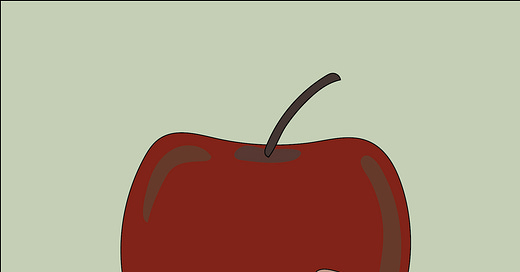Johnny loves apples. Sorry, I should say Johnny loved apples. Well, he must have loved them because he was always crunching on one at break-time.
Johnny ate his apples with threatening relish, his needle eyes pointed toward us as we scuttled to the far end of the playground and the safety of the teacher's bored gaze.
Johnny loved to throw browning cores at the girls. He took pleasure in a good hit and crowed loudly when tiny pieces of sodden fruit splattered onto our school jumpers. The rotting remnants lodged deep within polyester fibres until they were washed out at the weekend.
One time, Johnny put his apple core into the collar of my blouse as I bent my neck over a maths book. I froze, my back stiffened to marble and limbs lurched to tear away from the part of me that was sullied with fruit flesh.
Forever tainted with Johnny’s yellow-toothed spittle, my skin scorched as the core trailed a rhythmic trundle toward my white cotton vest. It seeped a stain of grey that no amount of washing could remove.
Yes, Johnny loved apples and I hated Johnny’s apples but I can’t speak of them now because Johnny is dead.
At the funeral service they said that Johnny sang like an Angel but I can’t remember Johnny singing. He must have had a lovely voice for them to say it.
One school play, a Christmas Nativity, Johnny stood on a plastic chair at the back of the stage. I think he was a tree, or a cow. He definitely wasn’t a wise man or shepherd as he had no crown or tea towel on his head. Though, if he was a beautiful singer, I don’t know why he was relegated to wobble on the splay-legged chair in the eaves.
It was Clara who sang ‘O Holy Night’ to the sea of eyes angled up from dark faces. I remember trembling for her because her goosebumped energy was palpable. And when her pretty voice shook with unintentional vibrato, Johnny sang along with a grossly exaggerated quiver. I was so cross, I stared hard at him, branding him with my disapproval. Johnny didn’t care though, he stood tall and peacocked, basking in the guffaws of the other chair-standers.
Johnny was dragged over the scuffed floor of the P.E. hall afterwards. I remember his doughy cheeks gurning ridiculous faces as he apologised, under duress, to Clara. And I can still see the rivulets of sooty tears, darkened with eyeliner and orange panstick, dribbling onto the white satin of her holy communion dress. I felt sad for that dress, it was the prettiest in the class.
Johnny died a hero, saving the life of a younger boy who had dashed into the path of harried school run traffic.
On the pulpit, the priest recounted how Johnny, in an act of courage, pulled the little child to safety. How Johnny, by grabbing the full-to-groaning bag on the boy’s back, had swung the child onto the grassy verge of the footpath and out of harm's way.
And, with a tear-clogged gulp, he told the story of how Johnny, in this brave act, was struck by the black SUV. A monster vehicle with bull bars that had never seen dirt until the day that Johnny’s blood sprayed rubies over the pristine steel and glass.
With fervour that knocked all heads to nodding, the Priest explained that God had chosen the brave Johnny to join the choir of Angels in heaven; where his melodious voice would ring out from his position on the right hand of the Lord.
I never said that I watched as Johnny chased the gasping boy up through the playground and out of the school gates. That I clenched my jaw and bit my cheeks each time Johnny cackled as the child tripped in fear. I cannot speak of it now, for Johnny is dead. Johnny will forever be an Angel.
And Angel Johnny must have had good intentions for the Priest said that only the good die young.
Marie-Louise McGuinness comes from a wonderfully neurodiverse household in rural Northern Ireland. She has work published in numerous literary magazines including Splonk, Bending Genres, Intrepidus Ink, Bright Flash Fiction Review, The Metaworker, JAKE, Flash Fiction Magazine and The Airgonaut amongst others. She enjoys writing from a sensory perspective.




